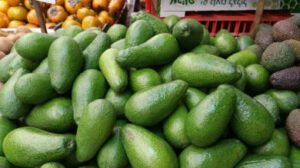Last updated on May 24, 2025
So, you’re wondering, “Is avocado farming profitable in South Africa?” It’s a question I get asked a lot, and honestly? Yes, it absolutely can be! But here’s the kicker: it’s not just a case of putting trees in the ground and watching the money roll in. Far from it! It takes smart decisions, hard work, and a real understanding of what makes this farming business tick in our unique South African landscape. I’ve seen firsthand how rewarding it can be when done right, but I’ve also seen the pitfalls. Let’s look into what I’ve learned and what the latest info tells us about making avocado farming profitable here at home.
So, is avocado farming in South Africa profitable? Yes, it can be highly profitable, but success hinges on smart management, significant initial investment, and navigating market dynamics and environmental challenges. While requiring patience as trees mature, strong global demand, particularly in export markets, presents substantial opportunities for a well-managed farming business here.
Is Avocado Farming in South Africa Really Worth It? An Overview
Yes, avocado farming can be profitable in South Africa, provided it’s done under the right conditions and with effective management. The growing global demand and expanding export markets present significant opportunities for South African producers. Achieving profitability requires a substantial initial investment and diligent ongoing management.




This isn’t a passive venture. It’s a dynamic farming business with great potential rewards for those who commit to it. As agricultural economist Wandile Sihlobo puts it, “Better profitability levels are vital for the long-term growth of the avocado industry, job creation, and sustainability of various rural communities” (Wandile Sihlobo, January 17, 2025).
What Factors Influence Avocado Farming Profitability in South Africa?
Several key factors significantly influence whether an avocado farming operation in South Africa will be profitable. These include yield per hectare, the varieties planted, planting density, and crucial management practices. Getting these elements right is absolutely non-negotiable for building a successful farming business.
Yields, Varieties, and Planting Density: Key to Profitable Avocado Farming in South Africa
The amount of fruit you can harvest per area is a primary driver of income. Your avocado yield per hectare South Africa directly impacts your revenue potential. This yield isn’t just random; it’s heavily influenced by the avocado varieties South Africa farmers choose and how densely they plant.
While exact figures vary wildly based on location and management, a well-managed Hass orchard in its prime might yield anywhere from 10 to 20 tons per hectare, sometimes even more! Fuerte yields can be a bit more variable. Choosing the right variety for your specific area and target market is super important, especially considering the strong export demand for varieties like Hass.
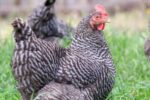
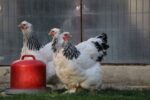
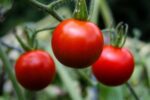

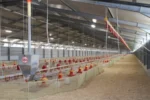
As Dr. Guy Witney, project manager at Great Brak Avos, notes, “Hass and newer dark-skinned Hass-like varieties like GEM and Lamb Hass are really popular,” having overtaken Fuerte in importance (Farmer’s Weekly, February 2, 2025). For instance, in the Western Cape, new orchards are coming into production. Early estimates for the 2025 season project a significant increase in the crop from just over 3,000 tonnes last season to between 5,000 and 6,500 tonnes. This shows the impact of new plantings on regional yield (George Herald, April 10, 2025). High-density planting can potentially increase early yields but comes with higher initial costs.
Why Good Management Practices are Crucial for Profitability
Top-notch management practices are essential for maximizing your returns and ensuring the long-term health of your orchard. Without diligent care, even the best land and varieties won’t reach their full potential. This means getting irrigation for avocados South Africa spot on. Avocados are thirsty trees requiring consistent, adequate water.
Dr. Witney emphasizes that before establishing an orchard, you “must ensure the area earmarked to be planted to avocados has adequate high-quality water to support a mature avocado orchard. Avocados require 3 000m³ to 5 000m³ of water per hectare per year, depending on rainfall” (Farmer’s Weekly, February 2, 2025). Effective management also includes robust strategies for dealing with avocado pests South Africa and avocado diseases South Africa, like the persistent Phytophthora root rot (a serious soil-borne disease).
Dr. Witney highlights that “Phytophthora root rot remains the most important disease challenge.” Managing it involves “building ridges… providing organic mulches… as well as using root rot-resistant rootstocks” (Farmer’s Weekly, February 2, 2025). The industry also has an ASBVd-free nursery certification programme to help combat diseases from the start (Farmer’s Weekly, February 2, 2025). Proper feeding, pruning, and general orchard health monitoring are also critical for sustained avocado production South Africa.

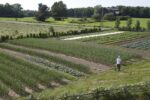


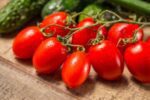
When Does Avocado Farming Become Profitable in South Africa?
Commercial profitability in avocado farming in South Africa usually begins around year five to six. This is when revenue consistently exceeds costs. Achieving this milestone requires patience and a long-term perspective. It’s definitely not a quick win.
Typically, avocado trees will start bearing a small amount of fruit around their third year. This timeline for commercial profitability is because the trees are still growing and developing their canopy and root systems in the early years. Their fruit-bearing capacity increases significantly as they mature. By year 5-6, they should be producing enough volume to start offsetting those initial establishment costs and ongoing operational expenses.
Dr. Guy Witney offers an encouraging perspective, stating that “the return on the initial investment far exceeds the investment itself” (Farmer’s Weekly, February 2, 2025). Your trees will hit their full production stride in later years, further increasing profitability.
How Do Market Dynamics Impact Avocado Farming Profitability?
Market dynamics significantly impact avocado farming profitability in South Africa. They influence prices, demand, and access to lucrative local and export opportunities. The market where you sell your avocados plays a crucial role in determining your profitability. Understanding and navigating these dynamics is essential for success in this farming business South Africa.




Local and Export Markets: Opportunities and Challenges
South Africa benefits from both a growing domestic avocado market South Africa and access to lucrative international markets. While the local market is important, the higher returns, especially for premium varieties, are often found in avocado export South Africa. The European Union and the UK are traditionally our strongest export destinations. They account for 95% of our current exports (including Russia and the Baltic states), with the Middle East taking another 2.5% (Farmer’s Weekly, March 31, 2025).
Derek Donkin, CEO of Subtrop (who represent the avocado sector), confirms that “Europe and the UK remains our most important marketing regions” and they “annually see growth in the consumer market” (Food Business Africa, April 14, 2025). The Western Cape, for example, is strategically positioned as a late-season producer. This allows us to extend the export season to Europe when demand is strong (George Herald, April 10, 2025). What this means in practice is that farmers in different regions can target different market windows, which is pretty smart!
However, relying too heavily on just a few markets can be risky. That’s why the recent opening of the Chinese market is such a big deal! China, with its massive and growing middle class, presents a game-changing opportunity. We’ve just completed our first season exporting there. Early signs are really promising, with Chinese importers praising the quality of our fruit (africanfarming.com, April 3, 2025). The success of the initial shipment in 2024 has given exporters confidence to increase shipments in 2025 (Food Business Africa, April 3, 2025).
We’re also looking at India, although high import tariffs there (30%) are a bit of a hurdle right now compared to China’s lower tariff (7%). This highlights the impact of trade conditions on market viability (Farmer’s Weekly, March 31, 2025). Diversifying where we send our avocados helps spread the risk. It can lead to more stable and higher avocado prices South Africa farmers receive.


 📈 ROI Strategy: Soybean Farming Profit Per Acre – How Much Do You Make Off An Acre Of Soybeans? →
📈 ROI Strategy: Soybean Farming Profit Per Acre – How Much Do You Make Off An Acre Of Soybeans? →Speaking of prices, they can fluctuate quite a bit! Locally, avocado prices South Africa can range widely depending on the season and supply. Recent domestic prices have been between R5 and R83.12 per kg (Tridge, March 2025). Export prices are typically higher, but also subject to global market conditions and exchange rates.
In early April 2025, wholesale Hass avocado prices were reported around R20-R25 per kg for certain specifications (Tridge, April 9, 2025). Export prices can vary significantly based on destination and quality.
Market Access and Global Demand: Crucial for Profitable Farming
Maintaining and gaining access to international markets is essential for maximizing export potential. This involves meeting stringent phytosanitary requirements (health and safety standards for plants and plant products) and navigating trade agreements. The good news is that the global avocado market is still expanding. It’s driven by increasing health consciousness worldwide.
This rising demand provides a strong foundation for the profitability of subtropical farming South Africa, particularly for avocados. However, competition from other major producing countries like Peru and Chile is significant. This requires South African farmers to focus on quality and reliability.



What are the Costs Associated with Avocado Farming in South Africa?
The costs associated with avocado farming in South Africa fall into two main categories: significant initial establishment costs and ongoing production and marketing expenses. Understanding this financial outlay is critical for anyone considering this farming business South Africa.
Initial Establishment Costs: Getting Set Up
The initial establishment costs represent the significant upfront investment required to get an avocado farm going. This includes preparing the land (clearing, soil amelioration – improving soil quality, ridging). It also covers purchasing quality nursery trees (often grafted clonal rootstock for disease resistance, costing around R145 for a 1L seedling needing further growth) (Amorentia Estate & Nursery). Installing an efficient irrigation for avocados South Africa system is also a major cost.
While exact figures vary, initial establishment costs can easily range from R100,000 to R150,000 or more per hectare. This depends on the specific site and chosen infrastructure.
Ongoing Production and Marketing Costs: Keeping the Farm Running
Once the orchard is established, there are continuous ongoing production and marketing costs. These include expenses for fertilizers, pesticides, herbicides, water, and electricity for irrigation. Labor is a significant ongoing cost. It’s needed for maintenance, pruning, harvesting, and packing.




Finding skilled agricultural labor can be a challenge. There’s a recognized need to attract and train new individuals in the industry (Taylor & Francis Online, October 25, 2024). Transportation, logistics (especially for avocado export South Africa), marketing, and packaging costs also contribute to the annual expenditure.
Budgeting for anywhere from R30,000 to R60,000 per hectare annually for production costs (excluding harvesting, packing, and marketing) isn’t unreasonable. However, these figures can fluctuate based on yields and input prices.
Here’s a quick look at some key figures:
| Category | Range / Typical Figure | Source/Context |
| Avocado Yield (Hass, prime) | 10 – 20+ tons per hectare | General estimate based on well-managed orchards |
| Initial Establishment Cost | R100,000 – R150,000+ per hectare | Estimate (Land prep, trees, irrigation) |
| Ongoing Production Costs | R30,000 – R60,000 per hectare annually | Estimate (Excl. harvest/packing/marketing) |
| Local Price (March 2025) | R5 – R83.12 per kg | Tridge, March 2025 |
| Wholesale Hass Price (April 2025) | R20 – R25 per kg | Tridge, April 9, 2025 |
| Water Requirement | 3,000 – 5,000 m³ per hectare per year (depending on rainfall) | Dr. Guy Witney (Farmer’s Weekly, February 2, 2025) |
It’s a continuous cycle of investment to keep the farm running smoothly and profitably. Does thinking about these costs make you pause, or does the potential reward still look appealing?
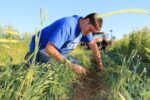

What Challenges Face Avocado Farmers in South Africa?
Avocado farmers in South Africa face a unique set of challenges. These include the impacts of climate change and environmental factors, as well as infrastructure, labor, and other operational hurdles. While the opportunities are real, being aware of these helps in better planning and risk mitigation for your farming business South Africa.
Climate Change and Environmental Factors: Battling the Elements
One of the most significant challenges is the impact of climate change and environmental factors. Increasingly unpredictable weather patterns, including droughts, heatwaves, and damaging hailstorms, can severely affect yields and fruit quality. Key avocado production areas South Africa like Limpopo and Mpumalanga are particularly susceptible to these extremes.
Water availability is a constant concern, even with efficient irrigation for avocados South Africa, especially in drier periods. There are also growing “ethical ground concerns” in export markets regarding the water intensity of avocado farming (Taylor & Francis Online, October 25, 2024). Changing climate can also exacerbate issues with avocado pests South Africa and avocado diseases South Africa, requiring vigilant management.
Infrastructure, Labor, and Other Operational Challenges: The Nitty-Gritty
Operational challenges beyond the farm gate also impact profitability. Inefficiencies at ports and sometimes poor road infrastructure can cause delays and add costs to exports. This affects the competitiveness of South African avocados in the global avocado market. Wandile Sihlobo points out that “We continue to see challenges of inefficient ports, poor roads, rising crime, and inept municipalities, all of which add costs to business and threaten the long-term growth of the broader agricultural sector” (Wandile Sihlobo, January 17, 2025). It’s a frustrating reality for many farmers trying to get their produce out there.
The shortage of skilled agricultural labor is another hurdle. Avocado farming requires specific expertise. Rising input costs and uncertainties around land reform policies can also create difficulties for the farming business South Africa.
What Opportunities Exist for Enhancing Profitability?
Despite the hurdles, there are significant opportunities for enhancing profitability in avocado farming in South Africa. These include exploring new markets and leveraging technological advancements and value-adding. These opportunities avocado farming South Africa can seize are key to long-term growth.
Exploring New Markets: Looking Beyond the Usual
Diversifying export destinations is a major opportunity. While traditional markets in Europe and the UK remain vital, the opening of new markets, particularly China, holds immense potential. The first official shipment to China in 2024 was a trial. Based on its success, exporters are confident about increasing shipments in 2025 (Food Business Africa, April 3, 2025). Derek Donkin notes that “The Chinese market is still developing, but the growing upper-middle class presents a major opportunity for South African avocados” (Food Business Africa, April 3, 2025). It’s exciting to see these new doors opening! Progress is also being made with market access in South Korea (Fruitnet, March 11, 2025). Exploring these new markets can lead to more stable and potentially higher avocado prices South Africa farmers receive.
Technological Advancements and Value-Adding: Getting Smart and Creative
Embracing technology and exploring value-adding opportunities are key to boosting profitability. Precision agriculture techniques can optimize resource use, saving costs and improving sustainability. Stellenbosch University is actively researching the use of “the most advanced technologies available, including artificial intelligence” in avocado farming (George Herald, April 10, 2025). It’s interesting to see how tech is becoming a bigger part of the farming landscape.
Investing in post-harvest management reduces losses and improves fruit quality, leading to better market prices. Furthermore, exploring value-adding opportunities, such as producing avocado oil or processed products, can create new revenue streams and a more resilient farming business South Africa. Companies are already innovating with technologies like high-pressure processing (HPP) to extend the shelf life of avocado products (Avolands).
Frequently Asked Questions (FAQs) on Is Avocado Farming Profitable in South Africa?
Is avocado farming profitable in South Africa?
Yes, avocado farming can be highly profitable in South Africa, but success depends on effective management, significant initial investment, and navigating market and environmental challenges.
What factors influence avocado farming profitability?
Key factors include the yield per hectare, the specific avocado varieties planted, planting density, and crucial management practices like irrigation, pest and disease control, and fertilization.
When does an avocado farm become profitable?
Avocado trees typically start bearing some fruit around year three, but commercial profitability, where revenue consistently exceeds costs, usually begins around year five to six as the trees mature and increase their yield.
What are the typical costs of starting an avocado farm?
Initial establishment costs can range from R100,000 to R150,000 or more per hectare, covering land preparation, purchasing trees (around R145 for a 1L seedling needing further growth), and installing irrigation.
What are the ongoing costs of avocado farming?
Ongoing annual production costs (excluding harvest, packing, and marketing) can range from R30,000 to R60,000 per hectare, including expenses for fertilizers, pesticides, water, electricity, and labor.
What are the main challenges for avocado farmers in South Africa?
Major challenges include unpredictable climate change impacts (droughts, heatwaves, hailstorms), water availability concerns, pests and diseases (like Phytophthora root rot), infrastructure inefficiencies (ports, roads), labor shortages, rising input costs, and land reform uncertainties.
What opportunities exist for growth in the South African avocado industry?
Opportunities include diversifying export markets (especially new markets like China and South Korea), adopting advanced technologies like precision agriculture and AI, improving post-harvest management, and exploring value-adding products like avocado oil or processed goods.
Wrapping It Up: Is Avocado Farming in South Africa a Profitable Bet?
So, after looking at all of this, where do we land on the question: “Is avocado farming profitable in South Africa?” My take is a resounding yes, if you approach it with your eyes wide open and a solid plan. It’s a farming business South Africa can excel at, especially given the global demand.
We’ve seen that factors like choosing the right avocado varieties South Africa offers, aiming for a strong avocado yield per hectare South Africa (think 10-20 tons in prime orchards!), and implementing stellar management practices, including smart irrigation for avocados South Africa and diligent control of avocado diseases South Africa and avocado pests South Africa, are absolutely critical.
Yes, there are significant upfront costs (potentially R100,000 – R150,000+ per hectare to start) and ongoing expenses (maybe R30,000 – R60,000 per hectare annually for production before harvest and marketing), but the potential returns, particularly from avocado export South Africa to markets hungry for our quality fruit, are substantial. The avocado market South Africa is vibrant, and the global avocado market is still growing.
We can’t ignore the challenges avocado farming South Africa presents, from the unpredictable nature of climate change (impacting key avocado production areas South Africa like Limpopo and Mpumalanga) to infrastructure hiccups like port inefficiencies and the need for skilled labor. But, and this is important, there are clear opportunities avocado farming South Africa can seize – diversifying markets (hello, China!), embracing technology, and exploring value-adding (like HPP avocado products).
The major avocado production areas South Africa, like Limpopo avocado farming, Mpumalanga avocado farming, and KwaZulu-Natal avocado farming, continue to be powerhouses. We’re also seeing growth in newer regions like the Western Cape, extending our season (George Herald, April 10, 2025). This expansion is a testament to the potential for agricultural profitability South Africa holds in this sector.
For emerging avocado farmers South Africa, while the path might seem daunting with the initial investment and learning curve, there’s increasing support and a wealth of knowledge within the industry to tap into.
Ultimately, avocado farming South Africa is a long-term investment. It requires resilience, adaptability, and a commitment to best practices. It’s not a get-rich-quick scheme, but for those willing to put in the work and navigate the complexities, the potential for significant and sustainable profitable farming South Africa in the avocado industry is definitely within reach.
What are your final thoughts on the profitability of avocado farming here? Are you feeling more or less optimistic after digging into the details? Let me know!
Important Disclaimer: The information provided in this article is intended for general knowledge and informational purposes only, and does not constitute financial, agricultural, or professional advice. Farming profitability is subject to numerous variables, including market fluctuations, climate conditions, disease outbreaks, management practices, and economic factors. Before making any investment decisions or implementing farming practices, it is essential to consult with qualified financial advisors, agricultural experts, and other relevant professionals who can provide advice tailored to your specific circumstances and local conditions. Reliance on the information presented here is solely at your own risk.
